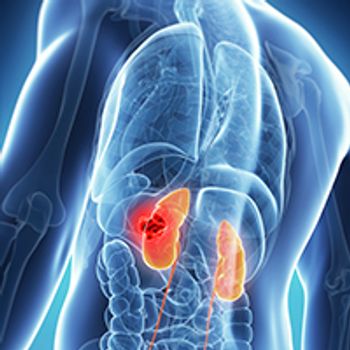
Genitourinary Cancers
Latest News

Latest Videos

CME Content
More News

Hans J. Hammers, MD, PhD, associate professor, Internal Medicine, UT Southwestern Medical Center, discusses the potential combination of IDO inhibitors and PD-1 inhibitors in renal cell carcinoma.

Michael R. Harrison, MD, assistant professor of medicine, Duke Cancer Institute, discusses choosing frontline treatment for patients with renal cell carcinoma (RCC).

It has been a landmark year for immunotherapy in bladder cancer with the approval of 5 checkpoint inhibitors across first and second line.

The combination of PD-1 or PD-L1 inhibitors with existing frontline therapies could represent a superior approach for some treatment-naïve patients with renal cell carcinoma.

Stemming from the wave of checkpoint inhibitor approvals, multiple trials have begun evaluating immunotherapies in combination with other agents for the treatment of patients with advanced bladder cancer.

Elizabeth Plimack, MD, director of Genitourinary Clinical Research at Fox Chase Cancer Center, discusses checkpoint inhibitors in the frontline setting of bladder cancer.

David F. McDermott, MD, director of the Biologic Therapy Program at Beth Israel Deaconess Medical Center, discusses the combination of nivolumab (Opdivo) and ipilimumab (Yervoy) in renal cell carcinoma (RCC).

Elizabeth Plimack, MD, discusses the impact of the immunotherapy approvals in the first- and second-line setting for bladder cancer and the future of combinations for these patients.

Terence Friedlander, MD, an assistant clinical professor in the Division of Hematology/Oncology, Helen Diller Family Comprehensive Cancer Center, University of California, San Francisco, discusses checkpoint inhibitors in the second-line setting for patients with bladder cancer.

Petros Grivas, MD, shares insight on the value of combining immunotherapy regimens in the treatment of patients with urothelial carcinoma.

Neeraj Agarwal, MD, recaps the latest advancements in newly diagnosed RCC.

Jeffrey M. Holzbeierlein, MD, professor, director of Urologic Oncology, Department of Urology, University of Kansas Medical Center, discusses the management guidelines for patients with bladder cancer.

Eric Jonasch, MD, professor, The University of Texas MD Anderson Cancer Center, discusses the CABOSUN study in renal cell carcinoma (RCC).

The European Commission has approved abiraterone acetate (Zytiga) in combination with prednisone/prednisolone for the treatment of adult men with newly-diagnosed high-risk metastatic hormone-sensitive prostate cancer.

Brant Inman, MD, surgical oncologist, urologic oncologist, Duke Cancer Center, discusses novel immunotherapy combinations for patients with bladder cancer.

Patients with high-risk renal cell carcinoma who harbor early systemic dissemination with very poor survival prognosis may derive some benefit from adjuvant therapy.

Maria De Santis, MD, discusses the findings of KEYNOTE-045 and the future of immunotherapy in the treatment landscape of bladder cancer.

Umberto Capitanio, MD, FEBU, department of Urology, San Raffaele Scientific Institute, University Vita-Salute San Raffaele, discusses adjuvant therapy for patients with high-risk kidney cancer without metastases.

Thomas Powles, MD, Barts Cancer Institute, discusses the impact of immunotherapy on the treatment landscape of kidney cancer.

A newly proposed urology-specific alternative payment model could save up to 37% on costs of care, partly by giving physicians incentives to pursue active surveillance rather than active intervention, according to the Large Urology Group Practice Association.

Andrea Necchi, MD, discusses the evolution of bladder cancer therapies, the challenge with the currently available agents, and the next steps and clinical trials being conducted in the field.

Four molecular subtypes of clear-cell renal cell carcinoma were prognostic for outcomes after metastasectomy, with striking differences seen in overall survival and disease-free survival between each of the groups.

Kerstin Junker, MD, associate professor, Department of Urology, Universit

An extension in overall survival seen with the combination of nivolumab and ipilimumab has completely changed the standard of care for patients with metastatic renal cell carcinoma.

Alessandro Volpe, MD, University of Eastern Piedmont Hospital, Maggiore Della Carita Hospital, Novara, Italy, discusses the management of locally advanced kidney cancer.













































